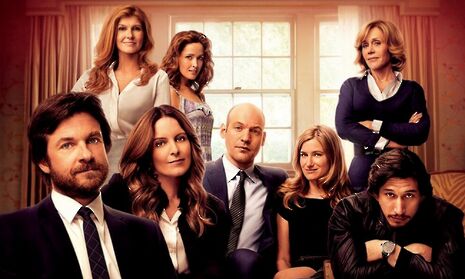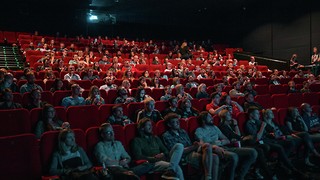Film: This Is Where I Leave You
Jessica Barnfield on how a weak script and rigid acting means Tina Fey’s new flick falls far short of expectation

Watching Tina Fey and Jason Bateman’s new flick This is Where I Leave You, you may get a creeping sense of déjà-vu.
The narrative bumbles from family black sheep Judd Altman (Bateman), whose ‘perfect’ life comes tumbling down and who is forced to reconnect with his dysfunctional but generally loving family, before realising that life is more perfect if it’s messy after all. Cue vague plotline of just about every heart-warming ‘finding yourself by going back to your roots’ movie to come out of Hollywood in recent years.
It is made all the more painful by the fact that Fey and Bateman are in it. Especially Tina Fey. She’s a long way from the witty, irreverent, and original humour of 30 Rock now.
Her lines seem to make her physically uncomfortable, and the heavy handed “punch” lines (excuse the pun if you’ve watched the trailer) land ever so slightly off-centre every time.
You can’t help but feel for the rest of the cast, too. Adam Driver, Rose Byrne, Corey Stoll and Jane Fonda are forced into contrived and trite family-drama stereotypes, and try as they might to break through these, the script just won’t allow it.
Bateman fares no better; he’s played this down-and-out nice guy so many times that at points in this film I was genuinely expecting Jennifer Aniston to enter onto the scene and start talking about sperm-swapping (The Switch) or else see him taken off to an exotic island à la Couples Retreat.
Forced to spend time with his adult-siblings following his father’s death, Judd encounters their various recycled problems.
Of particular cringe-factor are the baby making efforts of Paul (Corey Stoll) and his wife Annie (Kathryn Hahn). When he is told by his sister “You need to put a baby in that woman, like, yesterday”, Paul dutifully attempts to do so, but not before his wife has tried to seduce his siblings and smashed a few plates.
In the process of re-connecting with his family, Judd re-connects with an old flame (the lovely Rose Byrne) before somewhat patronisingly realising that the parochial life he left behind isn’t so bad.
There are some more surprising turns towards the second half of the movie, but not enough to lift the twee-factor and gain some proper giggles.
What is ultimately so frustrating about this film is that it has such a fantastic cast. The dialogue can’t keep up with them and they deliver their lines like robots, rarely exciting more than a brief titter from the audience. This is a film to save for a rainy, hungover Sunday, when there’s nothing else on Netflix.
 News / Tompkins Table 2025: Trinity widens gap on Christ’s19 August 2025
News / Tompkins Table 2025: Trinity widens gap on Christ’s19 August 2025 News / Delayed May Ball payments a ‘slap in the face’, say student workers21 August 2025
News / Delayed May Ball payments a ‘slap in the face’, say student workers21 August 2025 Interviews / Roger Mosey’s farewell to Cambridge21 August 2025
Interviews / Roger Mosey’s farewell to Cambridge21 August 2025 News / Pro-Palestine activists urge new Chancellor to ‘condemn Israel’20 August 2025
News / Pro-Palestine activists urge new Chancellor to ‘condemn Israel’20 August 2025 Comment / Yes, I love Britain20 August 2025
Comment / Yes, I love Britain20 August 2025








